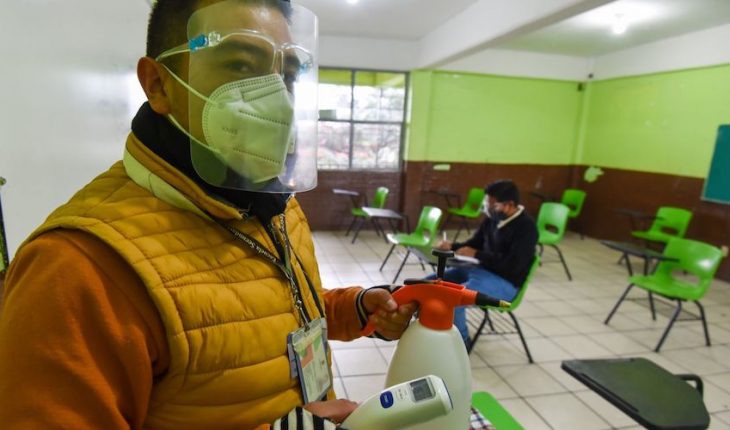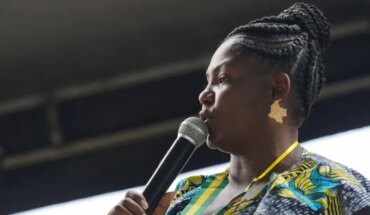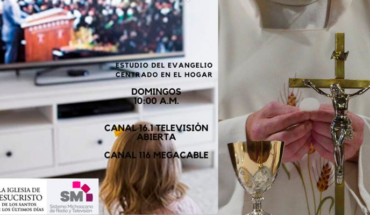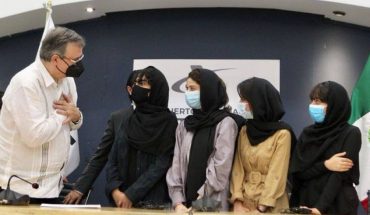Since the announcement made by the SEP regarding the “imminent” return to face-to-face classes on August 30, the teacher Jacqueline, teacher of a kindergarten in the mayor’s office of Tlalpan, does not stop receiving emails or messages from the parents of her students asking her how the return to the classrooms will be.
While it is true that 95% of the parents of her 22 students have said that they will not take their children to face-to-face school — a rejection that she shares because they do not have the right conditions — she regrets that the authorities are not clear about the procedure to follow so that it could be shared with parents so that they have other tools to decide to take, or not, to your children to face-to-face school.
Read more | Parent involvement, COVID screening and emotional support: the new back-to-school guide
“The authorities are saying that there is communication with the teachers, that things are clear, however, we as teachers have not been given the protocol that we are going to carry, not even options if my group decides that we will not return … we don’t know how we’re going to work,” reproaches the teacher with nine years of experience.
“There is no clear information, we as teachers are the ones who must face the parents who have many doubts, however, we have more doubts and there is no one who can solve them because the same supervisors and director do not know, so we are blind. ”
In the same situation is professor Carlos González, a teacher at the Tlacaélel elementary school, in the municipality of Ecatepec in the State of Mexico.
In an interview with Animal Politico, the teacher regretted the SEP’s decision to return to face-to-face classes in the middle of the third wave of infections without having a clear plan of how the step by step will be.
“We know that we must return at some point, but not in the middle of the third wave,” says the teacher with six years of experience.
“What the SEP offers or what the SEP says in the speech is heard very fatherly, but really those of us who make the decisions, who face all of this are the teachers who work in schools and not in front of a desk.”
With the statement made by President Andrés Manuel López Obrador that the commitment letter is not mandatory for the return to classes, the teacher stressed the lack of coordination and protocol to return safely to the classrooms because it confuses parents and feeds their distrust.
“They say one thing, they say another and we don’t really know what to do anymore,” he said.
Offer your computer
With less than two weeks to go before the start of the 2021-2022 school year, teacher Carlos Gonzalez says he is concerned. He doesn’t want any of his students to go backward.
Although people have the perception that in recent months the country’s public education teachers have done nothing, Carlos says it is totally false. Activities and new forms of learning have been devised on the screen of computers or cell phones.
Such is the case, that he let his principal know that he is willing to take his personal computer to teach students who decide to report to school and at the same time not neglect his students who prefer to continue taking virtual classes.
“There are no options, however we are seeing what to do with our own resources. I told my principal that I can carry my computer equipment without problem, but that they provide me with the internet so that I can provide service to my students who go to face-to-face and those who are at home. That would be ideal but we will not know exactly until 30 (August) because right now we are in a vacuum, in limbo, because there is a lot of information and a lot of misinformation, “says the professor.
Parents polled
In the absence of official information, the teachers of the kindergarten where Jacqueline works, who asked to be identified, took the initiative to send the parents of their students a small questionnaire asking their opinion on the return to face-to-face classes so that they could design some kind of alternative.
Of the first 12 responses he got, 11 were in refusal to take classes in person and only one spoke out about going back to school. “I don’t have a formal job at the moment and at home I have a hard time with my 3 children. It’s not the same way to learn,” was the response provided by the mother who spoke out about returning to the face-to-face scheme.
Meanwhile, those who reported that they will not take their children to school gave these answers: “I do not intend to expose my daughter to get sick or infected”, “Because there are not the necessary measures for them to attend school in this pandemic situation and because of the high rate of infection in children at this time of COVID-19,” “I don’t agree with sending my daughter to school. Nor will I sign a responsiva since I see that the SEP and the government want to disassociate themselves from all the responsibility that this implies.”, “What more I would like him to enter face-to-face since it does not help us virtually, but I also want him to be in good health”.
And although this exercise has been very important to Jacqueline and other teachers, she stresses that at the moment she does not know if these results will be taken into account by the authorities of her campus or the supervisors.
“The school does not have enough internet, we do not have a laptop or a tablet that we can use to give the class simultaneously so we are waiting for information on whether it is attended to the best in some days to those who want face-to-face and other days those who want online …”, explains the teacher.
At the beginning of the pandemic, she recalls, teaching preschool first-year children online was very difficult. Quite a challenge.
Even, she says, the parents had to chase their children around the house —with the camera on— until they agreed to sit and listen to the teacher.
“I had a first-year group of preschool, they are just entering school, obviously they could not be so long in front of a computer, there were even parents who had to run around with the camera so that the children would give in because the children did not want to, but with the passage of time, with strategies, with games made by me in a virtual way, they could already spend more time in front of the computer, and alone they learned to turn on and off the microphone, they attended more and more classes, the learnings they achieved despite being at a distance were very noticeable”, celebrates the teacher.
Last year only one of his students dropped out. All the others successfully completed the course and, according to the teacher, with very good results.
We too are afraid
“There’s a lot of fear. Working with my colleagues today we agree that the emotions we have right now are fear and uncertainty because we don’t know what’s going to happen,” says Jacqueline.
“Fear, in my case, because to get to work I have to take public transport and we know that there is no healthy distance, in addition the area where the kindergarten is is well known that they have not taken precautionary measures. ”
In addition, he considers that the dynamic that has been created with his students will be lost in the face-to-face modality because more than academic content will have to prioritize hygiene and health habits such as being aware that they do not touch the cover, that they wash their hands continuously and that they do not approach or share anything with their companions.
Elena Soto, for example, is a primary school teacher in the Mayor’s Office of Álvaro Obregón. For 10 years he has been dedicated to teaching and since the beginning of the pandemic he has taken measures to avoid getting infected, however, the possibility of returning to face-to-face classes has generated moments of anguish.
“From a very young age I was diagnosed with diabetes so when this COVID came I was very scared, they say that it hits us harder, that’s why I have taken care of myself a lot (…) and although I already have the vaccine it gives me a lot of anguish to think that I have to grab the Metro and a truck to get to my job because that’s where you get infected,” he explains.
For the teacher, continuing in online classes should be the option as infections decrease and the population, including minors, is finished vaccinating.
What we do at Animal Politico requires professional journalists, teamwork, dialogue with readers and something very important: independence. You can help us continue. Be part of the team.
Subscribe to Animal Politico, receive benefits and support free journalism.#YoSoyAnimal





